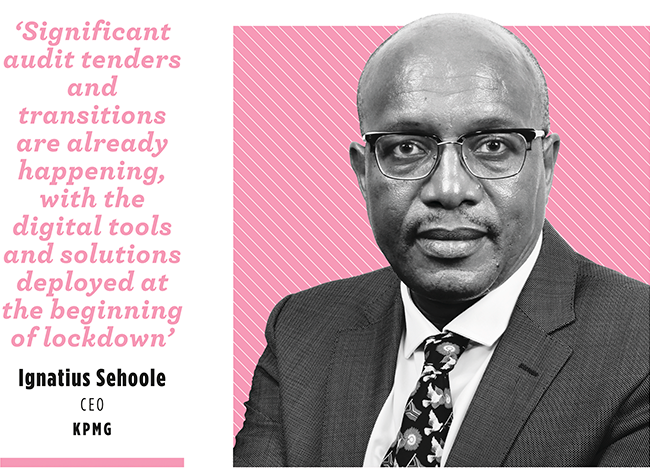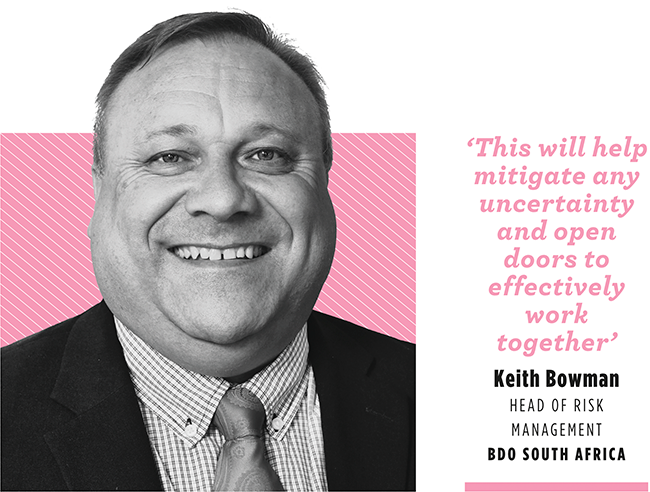A little more than three years ago, the Independent Regulatory Board for Auditors (IRBA) ruled that from 1 April 2023, auditors of public-interest entities must comply with mandatory audit-firm rotation (MAFR). But roughly halfway into the given six-year transition period, COVID-19 washed away any trace of operational norms. The ramifications of the ensuing lockdown regulations were severe, with many businesses being crippled and the surviving companies having had to transform their daily operations overnight in keeping with social-distancing regulations. In a handover phase, auditors would typically meet face-to-face to view files and exchange working papers, explains Keith Bowman, head of risk management at BDO South Africa. With COVID-19 regulations in place, audit firms have had to invest in ways that protect both firms and staff when sharing this kind of information. He adds that COVID-19 has had an impact on every major business process, and there is no doubt that the implementation of any change will introduce complexity to the existing business uncertainty.
Yet the extent to which COVID-19 will fully affect the implementation of MAFR remains to be seen, says Sanjay Ranchhoojee, partner and head of audit at Mazars. He believes, however, that most firms are well prepared to audit remotely, as they’ve been doing so successfully for the past few months. ‘We hope that we will be long past COVID-19 in 2023, but by transitioning earlier, most firms are capable to perform audits in a complete lockdown,’ he says.
Ignatius Sehoole, CEO of KPMG, agrees. The migration of audit processes to an online environment has complicated things but the audit and corporate sectors have responded positively to this change. ‘Significant audit tenders and transitions are already happening, with the digital tools and solutions deployed at the beginning of lockdown,’ he says. This in itself will change the way in which audits and audit rotations occur in the foreseeable future. For an auditor such as KPMG, the MAFR regulation completely changes its business model. All audit firms will rotate off their listed audit clients by 2023, which means the auditor will have had to secure new audit clients through the MAFR tendering process. ‘Where firms have held a key position as an auditor to a particular sector, that will not hold true post-MAFR,’ says Sehoole.

‘Similarly, in rotating into new sectors, audit firms will have to quickly build up those specialist skills – possibly by leveraging their international networks to best effect [with respect to] scarce skills and loss of professionals to the market.’ A direct result of MAFR will thus be that business and auditor relationships spanning years – in some cases, a number of decades – will have to be severed, meaning more hand-overs from auditor to auditor, which becomes an issue when this has to happen in a virtual environment. During the tender evaluation, the firms need to ensure that they are ready to present virtually, and a newly appointed audit firm will have to first establish a relationship with the client, which will pose unique challenges when done online. In its paper, Internal Audit Considerations in Response to COVID-19, Deloitte UK outlines the necessary steps auditors can take in navigating the social-distancing response.
The company advises that during virtual meetings, auditors must understand the level of electronic documentation available and request evidence as far as possible in advance to allow management to scan paper documents. ‘Identify all stakeholders per review and understand their availability during planned fieldwork dates,’ it states. ‘Schedule time with individuals to undertake remote walk-throughs (talk-throughs), progress updates and to discuss emerging findings.’

Auditors should also seek to adopt and increase the use of new technology, such as Microsoft Teams and Zoom, to deliver work, and consider recording these interactions for further evidence. Moreover, auditors must accelerate the deployment of analytics to deliver IA work remotely, increase coverage, focus on outliers, and reduce business interruptions while still providing valuable insights and assurance. Changing external auditors requires complex organisations to invest capital and time, from both the management and audit committee, as well as from the new auditors. Auditors can expect to incur additional costs as part of their transition into the audit, including the audit of the opening balances of a company, says Sehoole. COVID-19 may lead to even higher transitional costs. ‘Ensuring that new auditors are adequately up to speed before and during their first year of an audit should not be underestimated,’ he says. ‘The most successful audit transitions will be those that are fully co-ordinated between all parties.’
Data suggests that most companies are heeding the call from regulators and experts for early adoption. By April 2020, a quarter of the companies listed on the JSE had already rotated their auditors in anticipation of MAFR. Of those that have rotated in that time, 47% cite the early adoption of MAFR as the reason for the rotation, according to the IRBA. These firms would have been able to establish and build relationships with their new clients before and during the pandemic, long before the 2023 deadline. The other obvious benefit is that these companies will not be impacted, regarding client rotation, by the effective date of 1 April 2023, since their audit firm’s tenure will be far less than the maximum 10 years. ‘Given the steady uptake over the last three years, we can already foresee that, in the years 2027 to 2030, these companies will again be able to rotate with minimal disruption to the audit profession, and without any hindrance to the companies, as audit committees can already be sure to limit the procurement of prohibited services from any firm they may wish to rotate to in future,’ according to Bernard Agulhas, CEO of the IRBA.

For now, executives and audit committees can start by engaging with audit firms, says Bowman. The tender process can be extended to allow for a longer handover period. For example, a tender for audit to commence in December 2023 can start in January 2021 and be awarded in June 2021, which will allow the exiting audit firm enough time to engage with the new firm and ensure minimal disruption. ‘Doing so would require a change in tender processes, and broadened transparency and communication from all parties,’ he says. Co-operation between the company exiting and the newly appointed audit firm will be crucial. The tender process, says Bowman, should focus on evaluating audit quality and not just focus on fees. Also involve the shareholders in matters relating to an external audit and the auditor’s appointment, as well as the audit committee’s role and responsibilities. As companies and audit firms begin to accept MAFR and move towards implementation to join those that have already done so, the onus will be on the IRBA to ensure that the objectives of MAFR are being carefully monitored and met.
Remote working aside, MAFR may cause disruption to the firm’s professional staff complement, and rotating clients may not be replaced by other ‘equal’ clients. ‘Audit firms will have to be creative in finding opportunities for more auditors to be developed and upskilled with the knowledge and skills that are required to be proficient in auditing large complex public interest entities,’ says Bowman. During the transition phase, especially with remote auditing, companies must be open and transparent with executives charged with governance, the audit community and their investing public, on how these changes are being implemented. ‘This will help mitigate any uncertainty and open doors to effectively work together in a manner that would ultimately benefit everyone involved,’ he says.
Deloitte UK notes that in maintaining a corporate presence, an auditor must increase the number of progress meetings with key stakeholders across the business. ‘It is imperative that teams continue to develop strong relationships with clients built around trust, credibility and transparency.’








